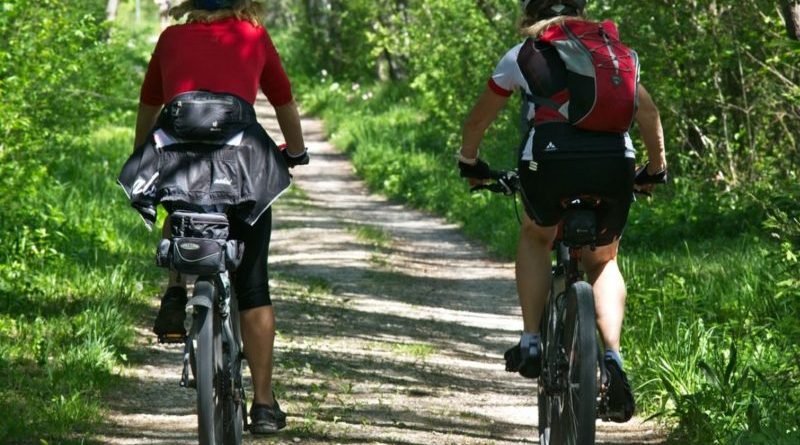Comment: Have baby boomers a societal debt to young cyclists?

By Mark Cramer, retiree, cycling advocate, regular contributor to Freewheeling France and now CI.N regular on senior cycling.
It’s been easier for boomers than for their children and grandchildren, in realms of employment, affordable housing, home mortgages and university tuition. Whether you see the disparity as poor economic policies, a radical redefinition of the employment market or intergenerational theft, the secure social and economic infrastructure for boomers stands in marked contrast with the declining security of subsequent generations.1
I have developed a strategy for helping my sons and daughters, and their offspring, to bridge the gap, and it’s based on the bicycle. The philosophy involves spending more money on what really contributes to a high quality of life and less, or nothing, on what has a neutral effect or diminishes the value of being.
As it now stands, younger generations seem more likely to buy a bicycle that’s been used, or online. I suggested to my son that the online bicycle lottery might end up costing him more, so he bought his bike from a local shop.
This strategy is applicable far beyond one’s own family.
Economics
In advocating commuting by bicycle rather than using a car, consider a non-partisan source, Forbes Magazine: Duran Valdez, “The Costs and Savings of Bicycle Commuting” (June, 2011):
…figuring in the cost of the bike, average maintenance, and equipment, I’ve had to spend about $1,112 to get through the year. If I’d gone cheap on the bike, this figure could be cut almost in half.
According to the AAA, the national average [car] cost per mile is 58.5 cents. So after putting a little fourth-grade math to work, I figure my driving costs for the year would have been $2,106. This means I saved roughly $994, even with such high starting costs. Next year, my savings should be a little more than $2,000. Not bad!
The $2,000 figure for savings is the accurate one in the long run, and that only involves commuting.
If he used his bicycle as vacation transportation, the savings would grow. And if he chose not to have a car and rely on cycling, walking and public transportation, it would add financial leverage. Amounts vary according to individual testimony. Writing on U.S. News Money, Chris Balish claims to have saved $120,000 in a 10-year carless period2, with the bicycle playing a major role in his transportation transformation.
Health
“Boomer angst” prompts me to try to make amends across the generation gap, but not just in the financial realm.
I have a grandson who lives in a sprawling car-dominated city where schools are generally beyond walking distance and car congestion is rampant around schools at drop-off and pick-up times. We boomers walked or cycled to school and it hurts some of us to see today’s children deprived of such purposeful exercise.
According to the Centers for Disease Control, “the percentage of children with obesity in the United States has more than tripled since the 1970s. Today, about one in five school-aged children (ages 6–19) has obesity”3.
“As recently as the 1970s, a majority of school kids walked or biked to school. Today, almost entirely because of sprawl, fewer than 15 percent do,” according to Kaid Benfield, “How Sprawl Makes Fighting Childhood Obesity So Much Harder” (CityLab, July 2013).
My grandson’s city boasts a comprehensive network of bike lanes, but they remain mostly empty. So I’ve begun communicating with the municipal officials, urging for a bike-to-school program, including an army of crossing guards to make it safe to cross some obscenely wide roads.
In the interest of public health, we should act on bridging the exercise gap. Millennials and Generation X are less exercise conscious than boomers. Consider the research.
When asked how they would define their overall fitness, Baby Boomers came out top: 86% of this group described themselves as “average or above” in fitness, whereas 72% of Generation X and only 69% of Millennials gave the same answer.
Baby Boomers also spend more time exercising, with 43% stating that they exercise most days and 29% of these committing 6-10 hours on exercise weekly. This compares to 24% of people from Generation X saying they exercise most days and only 21% of Millennials; in fact, 45% of Millennials say that they spend only 0-1 hours exercising on a weekly basis!4
In my own case, a blood test following a three-month summer vacation of cycling an average of 150 kilometers per week (and eating French pastries and cheeses along the way) resulted in a drop in cholesterol from 200 to 171, with improvements in all related cholesterol indicators.
For reasons of public health, cities around the world are encouraging cycling in order to reduce air pollution, a result that would serve to enhance the transfer of health security across the generation divide.
The massive study, “Walking and Cycling to Health: a Comparative Analysis of City, State and International Data” showed “statistically significant relationships—in the expected direction—between walking, cycling, and health at the country, state, and city levels,” though authors Pucher, Buehler, Bassett and Dannenberg acknowledge their powerful correlations do not yet prove causality5.
In categories of both personal finance and pro-active health, boomers can “give back” some of their advantages to newer generations by promoting cycling, beginning with their own families and extending into their communities.
This is why I shout “Help!”, asking the cycling industry to publicise cross-generational cycling: boomers with their kids and grandchildren, as well as bike-to-school programs.
I’m doing my part.
3https://www.cdc.gov/healthyschools/obesity/facts.htm
5 https://www.ncbi.nlm.nih.gov/pmc/articles/PMC2937005/



